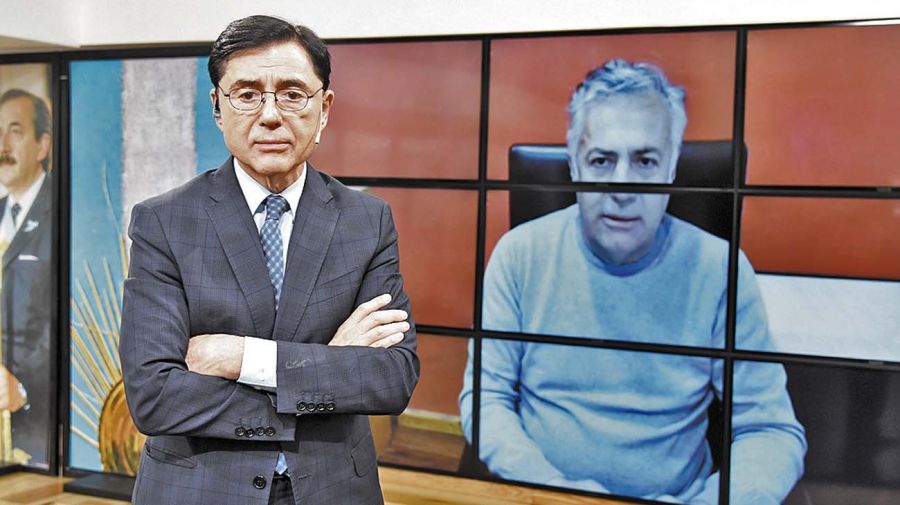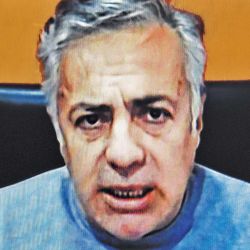Nominated as the Cambia Mendoza alliance’s gubernatorial candidate earlier this month after highly competitive PASO primaries, a result celebrated by Patricia Bullrich among others, Senator Alfredo Cornejo analyses the results of the different provincial elections up until now, giving his take on what could happen in the national elections, as well as the performance of the libertarians and Peronists at provincial level.
Firstly, I would like to congratulate you on your triumph, Alfredo, but were you expecting a bigger percentage difference over your rivals?
No, the truth is that the Cambia Mendoza front picked up 43 percent of the direct votes or 46 to 47 percent of the valid votes, subtracting the spoiled or blank ballots – a similar percentage to 2019, and the 2021 PASO primaries, including the senatorial voting, our trademark percentage. The Cambia Mendoza front covers the Radicals, PRO, certain other national parties, some local parties and all the other members of Juntos por el Cambio.
How can provincial elections be extrapolated to the national level?
That’s a very good question which I don’t see too often in public debate or the analyses of the pundits. I think that all the advanced provincial elections had some national ingredients, which I’m not going to ignore, but far more provincial factors because all the advanced elections until now have seen incumbent triumphs with two exceptions beginning with Neuquén where Rolando Figueroa won by a scant difference of two or three points over the Movimiento Popular Neuquino. And Rolando Figueroa was an MPN splinter, allied to the local PRO of Neuquén and a group of Radicals with Radical provincial party chairman Juan Peláez as his mayoral candidate [for the provincial capital]. So in Neuquén we have the first place where the incumbents did not win in the end.
But almost.
An incumbent splinter teaming up with other national alliances. Now what happened in San Luis, the other exception on the same Sunday as the Mendoza PASO primaries?
The same thing.
More or less the same thing. Even though [San Luis Province governor-elect Claudio] Poggi has been in Juntos por el Cambio for a while now, he received the support of [former Peronist governor] Adolfo Rodríguez Saá and he was also a splinter in his time. So there is a very strong provincial reading to this endorsement of incumbent administrations with some minor differences in that analysis. There is clearly a national influence.
Taking the case of Mendoza, as I recently said, the underperformance of the Peronists there should be attributed more to the national government than to their local leaders. There Mendoza Peronism imploded with some of their leaders starting to drift away to other lists like Unión Mendocina because they saw the misperformance of the national government. So to say that national performance has nothing to do with it would not be accurate, but to say that national performance explains provincial elections would not be accurate or balanced either.
Given the fact that the incumbents have won everywhere, even in the cases of San Luis and Neuquén, as you have quite validly noted, would this be indicating that society is not so much in conflict with its politicians, or the caste as [libertarian Javier] Milei calls them?
In every block of the citizenry there is great anguish and disappointment, which finds its sociological and collective expression. But in general, many Argentines view these processes with hope, not so much with disappointment. That does not mean that they are a big majority but they remain a majority. If we go asking in an opinion poll: “Are you fed up with all politicians?” you will get 90 percent answering you: “Yes.” But if we go asking about the politicians one by one, we will see that in many provinces there are several politicians who still have a good image. It [political disenchantment] might be a very superficial cliché into which people habitually fall but afterwards it is not verified in concrete practice.
That does not mean that the citizenry is in love with its politicians. No, quite the contrary, I would say. But they do single some politicians out. That does not happen at the national level where there is not a single leader whose positive performance outweighs their negative image. And there are very few people with a positive difference between positive and negative images and where there are, the difference is minute. Because at the national level there is the responsibility for this macro-economic disarray with changing times and political [ruling] coalition on the way. Frente de Todos, or Unión por la Patria as they now call themselves, cannot stay in government with this economic performance.
The candidates of Javier Milei’s La Libertad Avanza picked up a lot less votes than expected. Do you think that will happen to Milei at national level?
In 2019 [different] things happened in the PASO primaries and in the general elections. What must be taken into account is how the citizenry functions in the PASO context. It’s a much more lightweight vote than in the general elections, people vote far more freely in the PASO. In the general elections, citizens pay more attention to the executive than to the legislative level and into whose hands they are going to place their assets and freedom, taking a rather closer look. In 2019 the difference between the performances of Frente de Todos and Juntos por el Cambio was brutal, leaving no doubt that the election would be done and dusted in the first round and by a substantial margin. But finally, while it was indeed all over in the first round in October, Juntos por el Cambio made a great comeback with the same candidate, namely president [Mauricio] Macri. The mystique attributes it to those “Sí se puede”(“Yes we can”) marches and all the rest of it but I, quite honestly, would largely attribute it to Argentines running scared. People who hadn’t voted before or who had voted for third parties came out to vote, increasing the percentage of Juntos por el Cambio and Macri to 40 percent, which was a very good election compared with the PASO. So it seems to me that these elections could also be much the same. The PASO is a soft and calmer vote while in the general election greater certainty for what lies ahead is sought. And there I believe Juntos por el Cambio to be better positioned than La Libertad Avanza and Frente de Todos or rather Unión por la Patria.
Let’s see if you share this thesis: not only do the PASO primaries offer no absolute forecast of the first round but also the opinion polls do not forecast the PASO either.
Yes, I share that, quite categorically because the provincial elections are demonstrating that with the opinion polls so far off from what is coming out of the provincial elections because they are pretty assertive.
In the case of Milei, they are getting him wrong in all the provinces.
Exactly, the case of Milei somewhat ratifies what I’ve just been saying.
Patricia Bullrich went to Mendoza to celebrate your triumph. She always said you to be her ideal candidate for her running-mate and now there is talk of the outgoing Mendoza governor [Rodolfo] Suárez as a possibility for that slot. What is your current view of Juntos por el Cambio infighting and in the specific case of PRO, how do you see Patricia Bullrich and Horacio Rodríguez Larreta and how do you imagine it all ending up on August 13?
Let’s see, there are still some Radical candidatures which have yet to be confirmed hanging around or at least such is the public information. But we all know that the strongest candidates are Horacio Rodríguez Larreta and Patricia Bullrich or at least that is what is coming out of the opinion polls in general lines. That competition was inevitable and we could transform it into being healthy, as it was in 2021 when PRO and we UCR Radicals faced off in almost all the provinces. In 17 provinces we took it to the PASO primaries with UCR-PRO and PRO-UCR mixes in 16 of them with four lists in some provinces and 13 in others. Tucumán, Córdoba, Santa Fe and La Pampa were all cases in point, the case of very many provinces. In those 16 [provinces] where we competed with mixed lists, we won more votes in the general elections than in the sum totals of PASO so that the internal competition ended up being virtuous.

I believe the national PASO primaries nowadays to be confused and divided with Patricia hitting out at Horacio and Horacio at Patricia, a situation which could be virtuous since it would empower whoever wins the PASO, whether Patricia Bullrich, Horacio Rodríguez Larreta, Facundo Manes or Gerardo Morales. That reading whereby Milei individually could win more votes than any one of them is not objective. It did not happen before that whoever finishes top in PASO individually tops the others because afterwards in the final polling-booth the PASO partners disappear and the options are concentrated into being single, not multiple. So I believe this reasoning encourages such competition and that may benefit us. And the second thing which I see as positive is that the public debate in 2015 was very bad. The questions in the programmes between [Daniel] Scioli, [Sergio] Massa and Macri were purely to transmit hope to the citizenry with nobody saying how we were going to resolve the economic problems which we were already facing. Nobody committed themselves to a concrete path, it was all pure marketing. Such a superficial public debate did not allow for changes and did not give any mandate for change to president Macri at that time, objectively speaking. Afterwards, citizens were taken by surprise when their utility bills went up, our own voters were surprised by certain things which were never explained to them clearly. I see a greater depth in the public debate today. It’s not a very profound debate but deeper than it was in 2015 as to what is to be done with the economy and that seems to me positive. Having competition within Juntos por el Cambio when talking about the speed of change, of the labour, pension, tax and other reforms will be beneficial for the citizenry, I believe, so that they can see the way, laying a carpet for the road along which a mandate for real change in Argentina from the citizenry can be constructed.
You were one of Macri’s critics then. I remember you perfectly as one of the few Radicals to raise their voice. Even when Macri was vacationing in Villa La Angostura in early 2019, you went there to propose to him that he should not be the candidate in order for Cambiemos to win. Just as you were saying that the economic debate was previously evasive and is more explicit today, the very different visions for the country between Bullrich and Rodríguez Larreta are appearing far more clearly today. You will have heard mention of the “Malbec Radicals” where you are placed as primus inter pares among the least progressive Radicals versus the others. It is even said that [Jujuy Governor] Gerardo Morales backed your rival in the Mendoza primary. Are there two Radical schools somehow reviving those discussions between [Raúl] Alfonsín and [Ricardo] Balbín? I see you smile.
The ideological stances these days strike my attention. It takes me back to Alfonsín, who, when they were pointing out to him as a presidential candidate: “Doctor Alfonsín, many people say you’ve gone left,” replied: “I’m in the same place, the problem is that the country has turned right.” The truth is that there is a false dichotomy around what is progressive, you need to understand what is social progress and what is individual progress. [Leandro N.] Alem, with his liberal ideas on a free exchange rate at the time of the Unión Cívica Radical’s foundation, was then part of the 1880 generation and wanted the social, individual and material progress of people, that is being progressive. What is the definition of “progressive” nowadays? As defined by Kirchnerism? That definition does not fit into Radicalism nor the Juntos por el Cambio coalition. There are no two Radical parties nor two of PRO – in truth I don’t know that the differences are so substantial. I think that there is a discussion around the speed of the change and the civic consensus needed to carry out those changes, if via a superstructural agreement among the leaders within the élites or whether the common citizen should be conquered first so that they can pressure the élites with their consensus. Those are the two roads in discussion – I cannot imagine anybody proposing anything very different. [My Mendoza primary rival] Luis Petri, for example, is much tougher over both human rights and law and order issues than I am and said as much during the campaign. Such definitions seem pretty capricious to me. The substance of your question is whether the example of Patricia versus Horacio is also to be found within Radicalism – I do not see two Radical parties but only one which wishes to be within Juntos por el Cambio.
Should there be a purely Radical presidential ticket or should the party exclusively provide running-mates for PRO slates?
I think it is correct to speak of Radicalism as having one mind when it comes to the platform but when it comes to the 2023 elections, there are different visions. I will give you mine without claiming to represent anybody. The Radicals could have defined a single candidate, whether from the inland or Buenos Aires, but they should have done so two years ago with everybody working towards that end. And given the division between the two PRO candidates, the Radicals might have had a candidate who could win the PASO primaries over a competing Horacio Rodríguez Larreta and Patricia Bullrich. But because of our errors, which I do not attribute to anybody or perhaps to everybody, including myself, we did not build up a single candidate two years or 18 months ago and we are now up against the closure of the lists with the PRO candidates performing much more strongly than the Radical candidates. If we had built up such a candidate, it probably would have worked, always depending very much on the candidate, whether having a brand which can be projected and all the rest of it. All the inland leaders, including Gerardo [Morales] and myself, run into difficulties when up against the political figures of Buenos Aires because the Argentine political system is very centralist. The audiovisual media and communications are very Buenos Aires and that makes for a level of difficulty which is almost impossible to overcome for the performance of inland leaders.
Having been so critical of the Macri government for having given so little value to the Radicals in government decision-making and attaching that to the need for a Radical running-mate in both PRO tickets and assuming that Juntos por el Cambio win, how do you imagine your role in a coalition of government as opposed to an electoral coalition?
Regardless of who is president, the Radicals will be proposing their own ministers within a menu of options from whom the president will choose. That is how European, Latin American, etc. coalitions are formed. Not imposing any one minister on the president but offering a menu of options. That seems to me how working coalitions are formed and we are in a condition to make it happen.
Coming back to the question, should there be Radical running-mates in the two PRO tickets?
Yes, it would be legitimate for Radicalism to be well represented on those tickets. If any Radical wants to participate and compete like Ernesto Sanz in 2015, that wouldn’t be bad either, that could happen.
Don’t we have the same problem in both coalitions, an excessive presence of the past in the future?
I think that the past does indeed influence coalitions and political training. The past also influences Milei and his La Libertad Avanza because of two past decades of failure, which we can take back much further if we stretch history, but the concrete fact is that we have had practically the same gross domestic product for the last 15 years to distribute among more inhabitants so that this failure has its history.
If you focus on the leaders, the theory of the two demons is that Cristina [Fernández de Kirchner] is one demon and Macri the other but I don’t subscribe to that – they’re not the same. In Cristina, we have a person who does not accept the republican system, the separation of powers. She dreams of a Chinese regime, something like that. When you try to sound out her thinking a bit deeper, she speaks in her book Sinceramente and in several publications of wanting a Scandinavian or Norwegian country but she does not understand that in those places the private sector, the separation of powers and a republican system function with leading companies in technology where they have created a capitalist sphere of innovation. Her comparison of political systems is really with China, where an élite resolves the country’s destiny and runs the economy. Mauricio Macri accepts and believes in the republican system, that’s something very different. Both have committed errors, something bringing them together but then that is the common denominator of all political leaders. I don’t believe that to be a fair comparison.
Do you see them both as being on the way down?
I see them both as less influential, we can make a correct comparison there. But Cristina has always been a greater influence on Argentine political culture than Mauricio Macri.
Producción: Melody Acosta Rizza & Sol Bacigalupo.























Comments